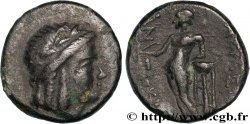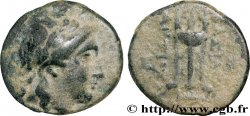v49_0429 - SIRIA - REGNO DI SIRIA - ANTIOCO III IL GRANDE Tétradrachme
MONNAIES 49 (2011)
Начальная цена : 225.00 €
Назначить цену : 450.00 €
непроданный лот
Начальная цена : 225.00 €
Назначить цену : 450.00 €
непроданный лот
Тип Tétradrachme
Дата: c. 200-187 AC.
Монетный двор / Город: Cilicie, Tarse
Металл: silver
Диаметр: 29 mm
Ориентация осей монеты: 12 h.
Вес: 17,21 g.
Редкость: R2
Комментарии о состоянии
Exemplaire sur un flan large et ovale avec le grènetis circulaire visible. Beau portrait, légèrement tréflé avec une frappe molle. Joli revers de style fin, bien venu à la frappe. Jolie patine de collection avec des reflets dorés
Ссылки в каталоге: :
Происхождение:
Cet exemplaire provient de la vente Burgan du 2 juillet 1994, n° 294
Лицевая сторона
Аверс: легенда: ANÉPIGRAPHE.
Аверс: описание: Tête diadémée d'Antiochus III à droite ; grènetis circulaire.
Обратная сторона
Реверс: Описание: Apollon nu assis à gauche sur l'omphalos, tenant une flèche de la main droite et appuyé sur son arc de la main gauche ; une massue à l’exergue tournée à droite.
Реверс: легенда: BASILEOS// ANT-IOCOU/ (AQ) - (NK)
Комментарий
Trace de double frappe au droit. Il existe plusieurs liaisons de coins.
Trace of double strike on the obverse. There are several die connections.
Trace of double strike on the obverse. There are several die connections.








 Cообщить об ошибке
Cообщить об ошибке Распечатать страницу
Распечатать страницу Отправить мой выбор
Отправить мой выбор Задать вопрос
Задать вопрос Consign / sell
Consign / sell
 Информация
Информация













